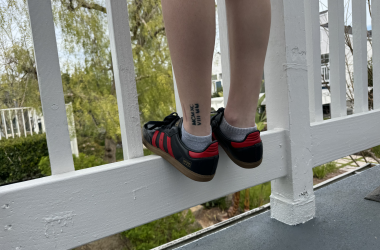As attitudes towards the LGBTQ+ community have changed over the past few decades, LGBTQ+ representation in media has soared to new heights. LGBTQ+ characters are now present in our books, our movies, our TV shows; the entertainment industry is slowly shifting from the cis-gender, hetero-normative nightmare it once was.
This change was certainly welcome among members of the LGBTQ+ community—there is something wholly gratifying and validating about seeing yourself represented in the media you consume. However, the increasing number of LGBTQ+ characters comes with a number of pitfalls. A laundry list of harmful tropes regarding LGBTQ+ stories can describe many of these pitfalls, such as the “bury your gays” trope and “the gay best friend” trope. Not to mention, LGBTQ+ characters can easily fall under a variety of damaging stereotypes, like Kurt Hummel from “Glee,” who is portrayed as an overly feminine gay man.
Of all those pitfalls, the coming out story is fallen into the most when it comes to LGBTQ+ representation. While not always completely inadequate, the problems with the coming out story tend to eclipse its merits. Clumsy, poorly executed coming out stories, such as Cheryl Blossom’s coming out in “Riverdale,” are bad enough simply because they aren’t implemented well. The more subtle threat, however, comes from the sheer amount of coming out stories in general.
The greater public cognition surrounding LGBTQ+ people is already overly obsessed with “coming out”—a concept that “is embraced only as otherness, a kind of queerientalism,” as described in an article by The Washington Post.
In society, coming out is consistently designated as the most important (and oftentimes final) step in embracing one’s sexuality/gender and finding acceptance.
Entertainment media further contributes to the strength of this idea in the social narrative, completely flooding many LGBTQ+ characters’ story arcs with shame-filled closeted life, dramatic declarations, homophobic families and the like. The overly contrived coming out story of the 2015 film “Jenny’s Wedding” exemplifies this idea, and its poor Rotten Tomatoes reviews reflect the changing public opinion of stories singularly focused around coming out.
It is also worth mentioning that in this context, “coming out” includes declarations of gender, as well as sexual orientation.
However, while the coming out story is both relevant and true to a vast number of LGBTQ+ people’s experiences, it is not the only story LGBTQ+ people belong to.
When LGBTQ+ characters are only shown overcoming adversity at the hands of homophobic people and navigating finding acceptance within society, it suddenly becomes the only thing they are valued for and capable of.
This implication creates a very hetero-centric narrative—one that is exploitative and altogether dangerous. It states LGBTQ+ people are not allowed to simply exist; they are not allowed to express their identity on their own terms; they are not allowed to live a life separate from their oppression.
Therefore, coming out in media, while oftentimes a happy moment of freedom, ultimately becomes about chaining LGBTQ+ characters to the community’s cultural, historical trauma—an ironic twist to a well-meaning story. It creates characters that are flat and one-dimensional; characters that exist without nuance and without vitality in the name of “diversity.”
When restricted to one narrative, they cannot become actualized human beings.
Correspondingly, the problem isn’t coming out itself; the problem is its dominance over the majority of LGBTQ+ related stories. “Stories matter,” novelist Chimamanda Ngozi Adichie explained in her TED Talk “The danger of a single story.” “Power is the ability not just to tell the story of another person, but to make it the definitive story of that person.”
Coming out has become the definitive story of the LGBTQ+ community in the media. Well-intentioned or not, constantly making a spectacle of LGBTQ+ characters inherently “others,” and alienates them from their straight, cisgender peers, barring LGBTQ+ characters from becoming fully normalized and integrated into the world, story and cast.
Adichie expands on the idea of a “single story” throughout her talk, specifically regarding singular racial narratives, which philosophically aligns with the nuances of LGBTQ+ representation in media, as well as on an intersectional level.
There are numerous examples of LGBTQ+ media that over glorify and extol both an elaborate coming out process and superfluous homophobia, such as “Love, Simon” and “Happiest Season.” Yes, their stories hold true to many people’s experiences—but are they the only experiences of the LGBTQ+ community?
According to Adichie, this is a primary example of a single story.
“Show a people as one thing … over and over again, and that is what they become,” Adichie said.
“Gideon the Ninth” by Tamsyn Muir and “The Song of Achilles” by Madeline Miller include unapologetic LGBTQ+ leads that both never explicitly come out and never feel as though their sexuality completely consumes the character. The protagonists of each book are homosexual characters, yet their sexuality does not solely define them, nor does the process of announcing it to the world.
The love stories the two ultimately fall into are not turned into some sort of disingenuous exhibition of pride, and therefore feel much more sincere than hollow reiterations of the same tired concept of coming out.
Similarly, “She-Ra and the Princess of Power” and “The Owl House” are TV shows that do not involve coming out whatsoever, creating a comforting sense of complete normalcy surrounding their LGBTQ+ casts.
LGBTQ+ representation in media can be powerful, beautiful and compelling if it can escape the static confines of the traditional coming out story. Coming out does not need to be completely erased from the LGBTQ+ media canon—however, more effort needs to be put forth to ensure LGBTQ+ characters are treated as fully realized people and not vessels for shallow generalizations of the LGBTQ+ experience.
Only then can we, as Adichie concludes, “regain a kind of paradise.”




